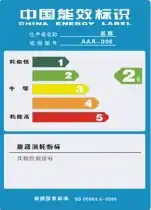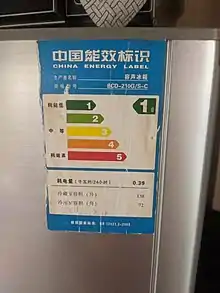China Energy Label
The China Energy Label (CEL,Chinese: 中国能效标识) is an energy consumption label for products in China, similar to the European Union energy label. Manufacturers of specified electronic devices are obligated to attach a CEL label to their goods to inform China-based consumers of the product's energy efficiency. The label includes the product's energy efficiency class (1–5) as well as information regarding its energy consumption.[1]


Targets
The CEL shows the level of energy consumption and, thus, the energy efficiency of a product. The CEL aims to encourage customers to buy energy efficient products.[2] The target to increase energy efficiency and the acceptance of Chinese consumers towards energy efficient products is highly important, since China is the world's largest energy consumer.[3]
Responsible authority
Applications are to be filed at the China Energy Label Center (CELC), which is the main authority for CEL-classification.[4]
Products requiring CEL
Since the introduction of China Energy Label in 2005, more than 25 product groups have become CEL-mandatory, while additional classes continually being added to the product catalogue. For every product that requires CEL, a GB-Standard has been implemented.[5]
Among the CEL mandatory products are:
- Motors
- Air conditioners
- Refrigerators
- Washing machines
- Gas kettles
- Water kettles
- Photocopiers
- Air compressors
- Flat-screen televisions
- Fluorescent tube[5]
See also
 European Union energy label, the energy rating label in the European Economic Area
European Union energy label, the energy rating label in the European Economic Area EnergyGuide, the energy rating label in the United States
EnergyGuide, the energy rating label in the United States.svg.png.webp)
 Energy rating label, the energy rating label in the Australia and New Zealand
Energy rating label, the energy rating label in the Australia and New Zealand
References
- "About the "Further information about CEL" Program". MPR. Archived from the original on 16 July 2014. Retrieved 8 August 2014.
- "Catalogue of CCC Certification". China Quality Certification Center.
- "About the "Background and Significance of the China Energy Label" Program". China Energy Label Center. Archived from the original on 13 July 2014. Retrieved 8 August 2014.
- "About the "China National Lead List of Excellent Enterprises and Energy-saving Products" Program". China Energy Label Center. Archived from the original on 8 August 2014. Retrieved 8 August 2014.
- "About the "Energy Effciency Standards" Program". China Energy Label Center. Archived from the original on 24 February 2015. Retrieved 8 August 2014.